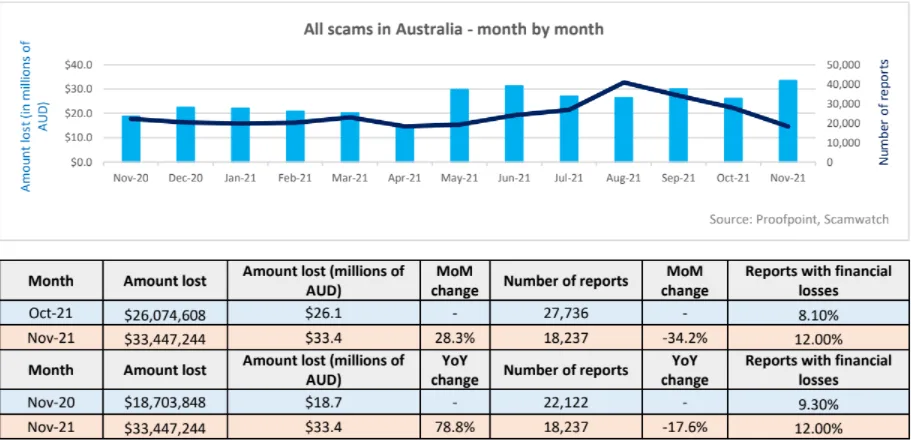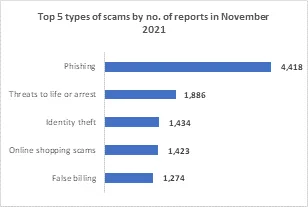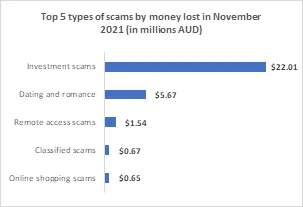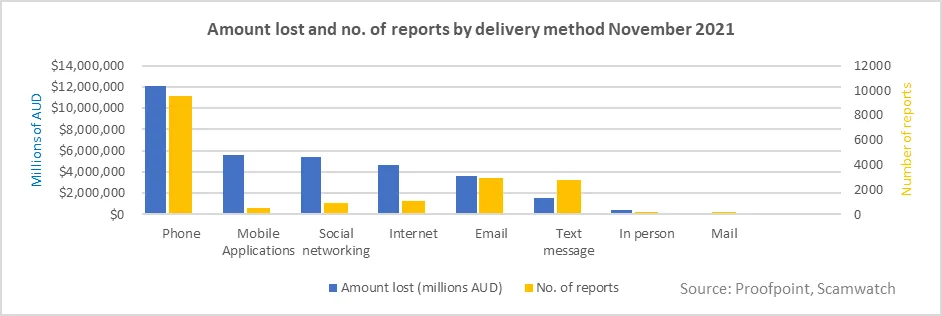Setting a new record for losses to scams in a single month
Australians lost a record $33.4 million to all types of scams in November – the highest monthly total on record, according to the latest figures from the Australian Competition and Consumer Commission’s (ACCC) Scamwatch.
• In November, investment scams made up 65% of the money lost at more than $22 million. •
Australians filled far fewer reports of scams in November (18,237) compared to October (27,736), marking this last reported month as an incredibly effective one for cybercriminals. Phone scams were the most profitable and most reported scam with 9,530 reports and $12 million in losses, double the amount lost in October.
Monthly record for scams
In November, the amount lost to scams increased by 28% from the previous month. The figure was also 78% higher than November 2020, when Australians reported $18.7 million in losses. The number of scams reported declined by more than 34% during November, with 18,237 scams compared to 27,736 in October. The number of scams with a financial loss was also the highest in nearly 18 months, with 12% of all reports resulting in economic damage in November.

Types of scams
In November, investment scams accounted for 65% of all money lost, totalling $22 million. While the number of investment scams reported increased by 8% last month, the amount lost more than doubled, suggesting scammers are successfully stealing money from Australians with fewer attempts.
According to Scamwatch, across 2021, investment scams have cost Australians more than $150 million, a stark comparison to the $65 million lost to these types of scams across the whole of 2020.
Dating and romance scams were the second most significant source of financial loss in November, costing Australians $5.6 million and nearly double the amount reported in October. Remote access scams represented the third-highest loss totalling $1.5 million, followed by classified scams. With one of the highest incidents of financial damage, Australians lost more than half a million to online


In November, phishing scams were the most reported type of scam, with 4,418 reports, a significant decrease from the 7,955 reported in October. Threats to life or arrest amassed 1,886 reports, followed by identity theft scams with 1,434. Dating and romance scams also rose slightly by 6% and investment scams by 8%, while all other types of scams decreased across the month.
Location and age groups
Australians in NSW accounted for $12.4 million of the total money lost in November, nearly doubling from October. Victorians with $6.6 million followed this. The sum of money lost to scams by residents in Tasmania, on the other hand, increased exponentially by more than 1700%, totalling $1.8 million.
Consistent with October, Australians over 65 were the most financially impacted by scams in November. These Australians accounted for 29% or $9.2 million of all losses, up from $6.8 million in October. Meanwhile, the amount lost by Australians aged 18-34 decreased during the month. Australians over 65 reported the most significant number of scams with 3,277 reports, followed by Australians aged 35 to 44 with 2,778 reports.
Delivery method
Phone scams were the most profitable and most reported scams in November. There were 9,530 reports, equating to $12 million, double the amount lost in October. Aside from phone scams, less traditional delivery methods saw the most significant losses throughout November. Mobile app scams equated to $5.5 million, an increase of 72% over the previous month. Social networking scams accounted for $5.5 million, followed by internet scams at $4.6 million.
Email scams were the second most reported delivery method with 2,960 reports. Phishing, classified, and false billing scams were among the types of scams most commonly carried out over email. Text message scams accounted for 2,770 reports, with hacking and dating and romance scams showing some of the most significant reports for this delivery method.

Proofpoint ANZ area vice-president Crispin Kerr, commented:
“The latest statistics from the ACCC’s Scamwatch highlight a reality that scammers are continuing to take advantage of Australians – particularly older Australians and reaping significant financial gains in the process. More than $33 million lost in a single month is disheartening and is a sign that scammers are not slowing down in the lead up to Christmas.
Whilst the number of scams reported in November dropped compared to the previous month, scammers are becoming more effective at stealing money with far fewer attempts. It could also result from lower reporting rates to the ACCC, but when looking at the financial impact on hardworking Australians, the figures are significant.
As we have seen throughout 2021, investment scams are absolutely the biggest single source of money lost. The $33 million gone in just one month is more than double the amount lost in October, despite only a relatively small increase in the number of reports.
Scammers continue to rip off Australians, taking their hard-earned money with the promise of fake investment opportunities and get-rich-quick schemes. The significant increase in November shows how scammers are leveraging the festive season, knowing investments can be an attractive opportunity to get extra cash ahead of Christmas. Of course, these offers are always too good to be true, but scammers will use cheap tricks and a sense of urgency to pressure people into making rash decisions with their money.
With the holidays approaching, the figures are showing a rise in money lost to dating and romance scams, topping $5.6 million in November – the highest since June. Scammers are taking advantage of upcoming holidays like Christmas and what can be a lonely time for people to scam millions out of Australians. It’s typical for scammers to go to great lengths to gain people’s trust, but it’s important never to send money or share important financial or personal information with someone you don’t know and be wary of fake dating profiles on apps or the internet.
Scammers are highly active around this time when people typically spend more money than usual, with events like Black Friday just passed and now Christmas.
Research from Proofpoint has found massive global increases in holiday-themed text (SMS) phishing (smishing), almost double from the same time last year. We urge Australians to remain vigilant as they are inundated with text messages ranging from fake parcel delivery scams to special retail offers that trick people into giving away their personal information.
Australians mustn’t get complacent and always err on the side of caution when it comes to any text message, email or phone call they receive. Ensuring older family members are also educated on how to spot a scam can help prevent further devasting losses during the holiday season.







